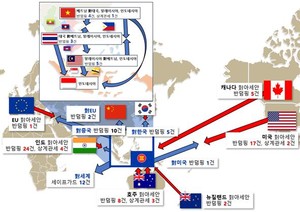
Last year, ASEAN’s import regulation to the world and ASEAN import regulation of the world occurred the most in history, indicating that Korean companies need special attention.
Vietnam, Korea’s largest investment destination and third-largest export country, is highly likely to be imposed higher anti-dumping tariffs than market economies because the United States considers it a non-market economy.
In particular, it was diagnosed that Korean companies that entered Vietnam need attention as the US has continued intensive import regulation measures, such as deciding on a subsidy that can be offset against the devaluation of the exchange rate in Vietnam in November last year.
According to the’Export and Investment Enterprise Risks Based on ASEAN’s Trade Remedy Status’ released on the 13th by the Institute for International Trade of the Korea International Trade Association, the ASEAN region emerged as a production base and consumption market replacing China after the US-China trade dispute, focusing on advanced countries. The survey on trade relief measures newly launched targeting ASEAN countries recorded 83 cases between January and October 2020, the highest ever.
By country, India (24 cases), the United States (17 cases), Australia (8 cases), and Canada (5 cases) in that order. In the case of the United States and the European Union (EU), investigations into attempts to circumvent trade relief measures by assembling, completing and exporting products in ASEAN have become active.
The report advised that “Korean companies that have entered ASEAN should also prepare in advance for the risk of becoming an investigation target when establishing business plans and procurement plans for raw materials and parts.”
At the same time, ASEAN countries’ protective trade measures are also being strengthened. Between January and November 2020, there were 48 new investigations on trade relief measures such as anti-dumping by ASEAN countries, the highest since 2012 (33).
Not only has the number of cases increased, but the trade relief system for each country is being operated in various ways. Thailand and Vietnam launched a detour investigation in 2020 and 2018, respectively, and Vietnam, in addition, initiated countervailing tariff investigations for the first time in the ASEAN region in September 2020.
Cambodia and Laos also revised related regulations from 2017 to introduce trade relief systems, and in Myanmar, the import protection law, including the trade relief provisions, will take effect on July 1st.
Kim Gyeong-hwa, a senior researcher at the Korea International Trade Association, pointed out that “it is essential for Korean companies to properly understand the current status of the ASEAN international trade relief in order to utilize the ASEAN market as a high-potential consumer and production base.”
